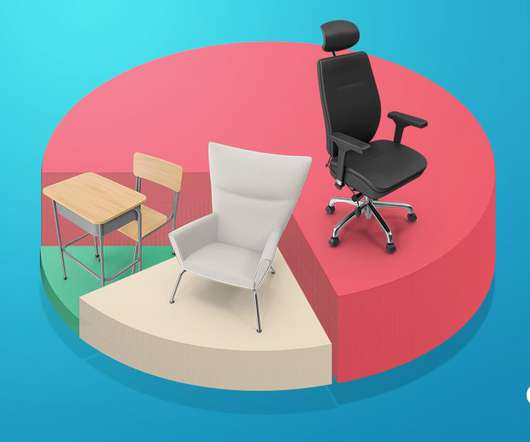Work as Improv Theater: Teaching the Right-Brained Learner.
Dashe & Thomson
JANUARY 11, 2011
Good content. Out of the box thinking is what makes the new world go round and round… Leave a Reply Click here to cancel reply. Properly d.
This site uses cookies to improve your experience. By viewing our content, you are accepting the use of cookies. To help us insure we adhere to various privacy regulations, please select your country/region of residence. If you do not select a country we will assume you are from the United States. View our privacy policy and terms of use.

Dashe & Thomson
JANUARY 11, 2011
Good content. Out of the box thinking is what makes the new world go round and round… Leave a Reply Click here to cancel reply. Properly d.

Upside Learning
MARCH 21, 2024
There may be times we need to change the behavior and aren’t measuring whether the behavior is impacting the business, or we just want to know learners are able to do new things at the end of the training. Those aren’t ideal, but they’re real, and we should similarly be designing for impact on those goals, regardless.
This site is protected by reCAPTCHA and the Google Privacy Policy and Terms of Service apply.

Docebo
JULY 8, 2021
While there remains a need for formal training environments to meet specific learning outcomes, the necessity for organizations to leverage platforms that enable social and informal learning, where learners network, share, collaborate, and exchange ideas to solve problems, is paramount. This is Bandura’s social learning theory.

Dashe & Thomson
MARCH 11, 2011
by Jolene on March 11, 2011 in Gaming Theory , Instructional Design , Training Development , eLearning Over the last year or so, I’ve been thinking a lot about how to incorporate games into eLearning instructional design projects. Rieber and Play Theory. Properly d.

Dashe & Thomson
MAY 8, 2011
What is new, however, is the ratio of on-demand solutions to more traditional training offerings. It makes a big difference to your design if the on-demand content will be needed while the learner sits at their computer or while they perform a requalification inspection on a propane cylinder on a loading dock.

Dashe & Thomson
MARCH 6, 2011
While we may like to believe that directing and guiding our learners to new understanding is the most effective way to educate, the traditional Instructor-Led Training (ILT) model fails to recognize that our learners have changed. So how do we best provide our learners of today with the best possible support and encouragement?

Dashe & Thomson
JANUARY 25, 2011
It’s in your mind One of the pioneers of adult learning theory, Malcom Knowles , explored the role of adult education and facilitation (andragogy) versus the traditional style of teaching children (pedagogy). To our learners, this is their reality. I discovered the teachable moment occurs in the minds of my learners, not mine.

Dashe & Thomson
MARCH 27, 2011
At first I couldn’t think whether I actually applied how training was delivered to these different types of learners. I found out that Accelerated Learning originated with a theory called “suggestopedia,” developed by a Bulgarian educator named Georgi Lazanov. Again there was a group for each type of learner. Properly d.

Dashe & Thomson
JANUARY 27, 2011
Because video is, apparently, a perfect manifestation of social learning theory. all factors the adult learner considers when deciding their learning programs and what they intend to glean from it. But why is video so much more effective at accelerating innovation than, say, print – or even eLearning? Properly d.

Dashe & Thomson
FEBRUARY 23, 2011
I see myself as a translator, taking complex ideas and systems and making them easy for a learner to understand. In medical education, “see one, do one, teach one&# is a common mantra. Most recently, Ive been working on training programs for the propane industry. As VP, Instructional Design Services for Dashe & Thomson, Inc.

Dashe & Thomson
MARCH 15, 2011
Some companies will use “Level 2: Learning” to measure whether the learners have mastered the training course content. McGoldrick described an approach to evaluating training that wasn’t just about changes in learner behavior but about learners integrated with and interacting within their own workplace. But it wasn’t.

Dashe & Thomson
DECEMBER 30, 2010
It’s hard to overstate the importance of learner engagement when teaching complex new material, and in this case the $2 whiteboard is far more effective at gaining that engagement. He contrasts two teaching methods that involve different kinds of whiteboards: one that costs $2,000, and one that costs $2. Properly d.

Dashe & Thomson
NOVEMBER 15, 2010
Before you commit to delivering a project based on these ratios (or buying services from someone based on them), it is useful to keep a few things in mind about eLearning Development Ratios: 1. Keep in mind, we were talking about 44 hours of learner time – developed in both instructor-led and eLearning formats).

Dashe & Thomson
NOVEMBER 24, 2010
Mobile learning should be a fast, easy user experience where learners can access a “robust library of content” and communicate with others. They are the epitome of a just-in-time device. So why not utilize these JIT devices for the JIT learning that we now demand as a society? Properly d.

Dashe & Thomson
NOVEMBER 24, 2010
Mobile learning should be a fast, easy user experience where learners can access a “robust library of content” and communicate with others. They are the epitome of a just-in-time device. So why not utilize these JIT devices for the JIT learning that we now demand as a society? Properly d.

Dashe & Thomson
MARCH 8, 2011
The gist of it was that even though we have an enormous amount of tools available to enable social learning across far reaching boundaries, the self-study type of eLearning seen in so many workplaces today can potentially cut learners off from any type of social interaction during the course of the learning.

Dashe & Thomson
MARCH 21, 2011
The eLearning modules act as the “lecture”, which learners do on their own time. The now-common blended learning practice of assigning one or more eLearning modules prior to attending classroom training is similar to the Khan/schoolteacher model. Properly d.

Docebo
MARCH 2, 2022
Needless to say, adults learn best in circumstances where: There’s the opportunity to practice : the information learned is relevant and has an abundance of scenarios where the learner can use it. This model is well known to produce a direct and positive impact on learner engagement and encourages learning that sticks.

Dashe & Thomson
APRIL 21, 2011
We are moving, albeit in fits and starts, from traditional learning environments, where curriculum are essentially assigned to learners, to more collaborative and innovative environments where learners can self-direct their learning and participate in communities of passion. Properly d.

Dashe & Thomson
JANUARY 14, 2011
View all posts by Jolene → ← Work as Improv Theater: Teaching the Right-Brained Learner The Freemium Three: Three Free Tools That Will Work Wonders For Your Next Training Project. I am currently the Director of Instructional Design and eLearning for Dashe & Thomson.In Properly d.

Dashe & Thomson
JANUARY 14, 2011
View all posts by Jolene → ← Work as Improv Theater: Teaching the Right-Brained Learner The Freemium Three: Three Free Tools That Will Work Wonders For Your Next Training Project. I am currently the Director of Instructional Design and eLearning for Dashe & Thomson.In Properly d.

Dashe & Thomson
NOVEMBER 24, 2010
Before you commit to delivering a project based on these ratios (or buying services from someone based on them), it is useful to keep a few things in mind about eLearning Development Ratios: 1. Keep in mind, we were talking about 44 hours of learner time – developed in both instructor-led and eLearning formats).

Dashe & Thomson
JANUARY 7, 2011
I’m not saying it’s the end-all, be-all for LMS but it may just engage a few more learners that would normally have shut the training, or their brains, off. This takes nothing away from the fact that millions of people use Facebook, are comfortable with Facebook, like Facebook and may prefer to learn using Facebook. Properly d.

Dashe & Thomson
JANUARY 7, 2011
I’m not saying it’s the end-all, be-all for LMS but it may just engage a few more learners that would normally have shut the training, or their brains, off. This takes nothing away from the fact that millions of people use Facebook, are comfortable with Facebook, like Facebook and may prefer to learn using Facebook. Properly d.

Docebo
MAY 8, 2018
While, there remains a need for formal training environments to meet specific learning outcomes, but the necessity for organizations to leverage platforms that enable social and informal learning, where learners network, share, collaborate and exchange ideas to solve problems, is paramount. Need proof? What is Social Learning?

Dashe & Thomson
MARCH 29, 2011
I see myself as a translator, taking complex ideas and systems and making them easy for a learner to understand. Most recently, Ive been working on training programs for the propane industry. As VP, Instructional Design Services for Dashe & Thomson, Inc. View all posts by Andrea → ← Accelerated Learning: Where Does It Fit In?

Dashe & Thomson
FEBRUARY 2, 2011
I see myself as a translator, taking complex ideas and systems and making them easy for a learner to understand. Most recently, Ive been working on training programs for the propane industry. As VP, Instructional Design Services for Dashe & Thomson, Inc. View all posts by Andrea → ← Web-Based, Instructor-Led, EPSS? Properly d.

Dashe & Thomson
JANUARY 19, 2011
I see myself as a translator, taking complex ideas and systems and making them easy for a learner to understand. Most recently, Ive been working on training programs for the propane industry. As VP, Instructional Design Services for Dashe & Thomson, Inc. View all posts by Andrea → ← Web-Based, Instructor-Led, EPSS? Properly d.

Dashe & Thomson
FEBRUARY 20, 2011
When engaging the learner, we must think about her sense of indwelling, because that is her greatest source of inspiration, but it is also the largest reservoir she has of tacit knowledge. Without the boundary set by the assignment there would be no medium for growth. Properly d.

EI Design
FEBRUARY 6, 2017
This article outlines how you can use social learning effectively to engage your learners. How Can You Use Social Learning To Engage Learners? The current dynamics (advent of social media channels, technology, and changing learner profiles) have accelerated its adoption by organizations now. It appeals only to Millennials.

Roundtable Learning
SEPTEMBER 30, 2020
They found that learners obtain knowledge best when doing hands-on activities because it enables them to discover and refine their job-related skills, make informed decisions, and tackle challenges at work. Proper performance support is key throughout the application of this model to ensure that learners feel supported and guided at work. .

TalentLMS
MAY 16, 2016
While retouching social learning theories is a requirement for this article, we cannot overstate the benefits this effort can incur for training professionals. In this post, we uncover some social eLearning strategies that will help harness better engagement and involvement for your learners. What is Social Learning?

TechSmith Camtasia
APRIL 4, 2017
I was recently in a conference workshop with Shannon Tipton (Learning Rebels) , and she made a bold statement, which was to the effect: Throw out the learning objective and focus on what you want the learner to actually do. Your learners also benefit. By narrowing your scope, your video will be more focused, and easier to create.

Growth Engineering
MAY 25, 2017
Who knew ratios could be so tasty? To reach our full potential we need to base our learning on theory and facts. To succeed, you first need to understand the rules of the road and theory that supports your growing practical skills. Formal learning is the theory and facts that informal learning builds on.

eLearning Weekly
OCTOBER 13, 2010
Although, that ratio, 18:1, might mean that a class with two teachers could have 36 students. With elearning–self-paced, web-based training–there is no teacher, so the ratio is imaginary and moot. The Dreyfus model shows how learners acquire skills from various training. But is class size insignificant?

EI Design
AUGUST 30, 2018
The reason social learning is finally gaining acceptance for employee training is on account of many factors notably: Changing learner profiles and they are clear on how they want to learn. As I have highlighted earlier, the social learning concept is not a new concept, and there are several theories that support it.

Matrix
JANUARY 3, 2017
You start with the theory, then get directions from an instructor, and the rest is up to you to practice, observe others, ask questions and get feedback. So before deciding the ratio of informal and collaborative learning, do a thorough check on who your learners are. Learning never stops. It’s a repetitive pattern.

eFront
JULY 14, 2016
Pedagogy and andragogy research indicate a higher order of thinking induced in the learner when they are encouraged to maintain certain reflective practices. After receiving feedback from the course mentor or training manager, the learner modifies their performance and behavior accordingly. What have you learned from the experience?

Continu
MARCH 5, 2020
Some of the newer features make managing content easier, an ability to personalize courses, better collaboration, and easier ways to connect with learners. Build manager to employee ratios for better company relationships. Ticken, Swiss Federation of Samaritans, Theorie Examen Trainer, BitSpec, and TrainingCourse.com.

Dashe & Thomson
FEBRUARY 15, 2011
Just as water will always find its own level by the path of least resistance, individual learners, working in collaboration and unhampered by the precepts of authority, tend to do an excellent job of finding and sharing what they need to know efficiently and effectively, even if they don’t necessarily know what they are looking for to begin with.

Big Dog, Little Dog
OCTOBER 5, 2009
Do learners really need learning objectives? Gagne says we should inform learners of the objectives to create a level of expectation for the learning. What level of learner engagement are we shooting for? This is called the Hebbian theory of synaptic plasticity and is the classical model for learning. Why do we do this?

Dashe & Thomson
APRIL 11, 2011
In his blog post The Death of Textbooks, the Dawn of Learning , Matt MacInnis, Inkling Founder and CEO, writes: Every learner has unique potential … When we engage each person as an individual, there’s hope that every person can fulfill that unique potential. So, what do you think? Properly d.

Dashe & Thomson
APRIL 14, 2011
The learner must adapt to how the material is presented, rather than adapting the way the material is presented to each learner. What if we could customize training programs for each learner using adaptive software technology? The former is expected, the latter is currently a daunting prospect in most learning situations.

Continu
JUNE 23, 2019
We will often release trainings that are “optional” instead of “mandatory” for our learners, and it’s not easy to delineate these two scenarios and it creates some havoc from a reporting perspective.”. Build manager to employee ratios for better company relationships. Poor analytics and reporting.
Expert insights. Personalized for you.
Are you sure you want to cancel your subscriptions?


Let's personalize your content